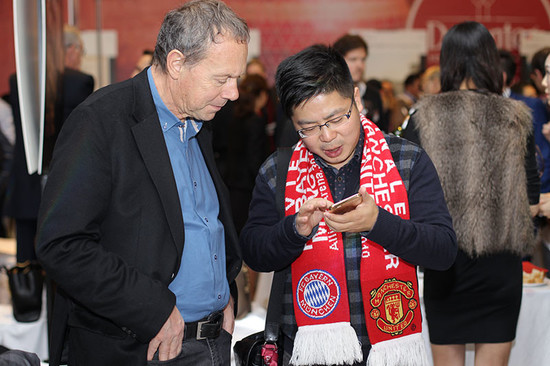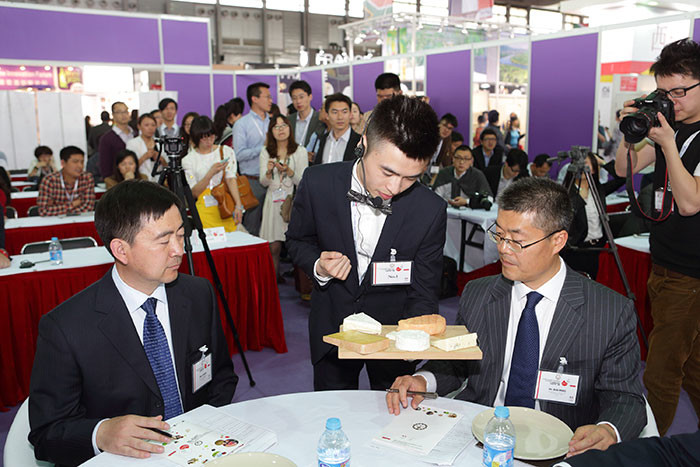Last night, my three colleagues and I hosted a wine show which was live-streamed on Taobao.com.
Trust me—it was more tiring than any of the wine courses I have ever taught. It felt like we had compressed the entire 6-day WSET level 3 course into one evening. To use a popular phrase in China: 'I felt my soul was drained from my body' after the show.

You may ask- 'But you’re a professional educator, what’s so tiring about just speaking to a camera?'
Yes, speaking is easy; but what if you’re talking to an audience of 66,217 people? Not only talking, you also have to respond to the tens of thousands of comments pouring in every second. Plus, as is the usual practice for online live shows - you need to do a few prize draws, give out some presents, dress up in costumes for a mini drama, dance and sing from time to time... Now you see why my soul was drained.
So, what exactly did we prepare for 66,217 people? We created a beginner's wine lecture. This included tips on spotting a fake wine, using wine as a social tool, how to tell the quality of a wine, and how to talk about wine knowledgeably. I think everything we taught was linked together fairly logically, and was practical even for those who knew nothing about wine. We went as far as making our own online channel logo called ‘Drunken TV’.
Yet we overlooked the fact that the immediate reactions of the audience are the greatest determining element of a live-streamed show. We had over 60,000 people watching the show, each with differing levels of wine knowledge, needs and expectations. The sheer range of comments and queries slashed our carefully prepared lecture to pieces.
We were forced to jump around different topics. Our exchange with the audience went like this: ‘Wines contain tannins and the effects of tannins are... (someone posts a comment) Hi, thanks for watching. You asked about screwcaps—so the advantages are... (new comment arrives) Yes, yes you’re right. When storing wines, you need to lay them down on one side to avoid... (another comment pops up) Yes I agree, to decant or not is sometimes difficult to decide...’ - and so on.
Soon enough we gave up on our original lecture, and it became a question and answer session with the audience. We answered their queries, recommended wines for the next day, and had to hold up a hand-made censorship board to cover our faces when we took a sneak sip of wine (drinking wine in front of a live camera is not permitted by the online channel).

We used singing and dancing, or made heart signs with our hands (<3) to express our appreciation of a particular wine. We also held up Emoji signs to convey our responses: ‘This is rather awkward’ or ‘This is obviously pretentious but rather cool’. I even had to lick the stones I brought from Châteauneuf-du-Pape to explain the term 'minerality'.
Thus, the live wine lecture we planned became a wine variety show. I felt exhausted but very happy—that rarely happens. The audience asked questions I’d never thought of before. They wanted to know the investment value of the Lafite 2010, and how much wine they should drink before going to bed. They were also curious about whether marinating snakes in a bottle of wine could be nourishing for health… Our show — which was originally planned for one hour — was extended for three hours.
By the end of the show, we received 1.5m ‘likes’. It immediately became one of the most watched and most ‘liked’ live show so far on Tmall’s food channel.
We were of course thrilled with the result. Also, we realised that those who watched the live show liked us more than the wines we recommended. In other words, they didn’t come to be educated or to be inundated with wine recommendations. They wanted casual and immediate interactions with the presenters. They didn’t necessarily want to learn anything — they just wanted to have some fun.
Wine is not an essential daily need, and it is usually only consumed on an occasional basis. If that is the case, what does live broadcasting—China’s most popular form of social media communication at the moment – have to offer the wine world?
My understanding is that people are streaming live channels for online retailers such as Taobao.com because they want to buy goods. Why don’t we draw these consumers’ attention to ‘wine-related people’ rather than wines? It’s much easier to remember a funny guy/girl who always talks about wine online, rather than unfamiliar wine brands and producer names. Then when the day arrives when they are in need of wine, they are more likely to think of that on-screen personality and the things they said. Buying will follow naturally.
For the wine world, to gain a success through live broadcasting—just as it worked for Weibo and WeChat—we need young online broadcasters who are both professional and charming.
So — are you one of them?
Also read:
· Terry Xu: Do we really need a wine app?
· Julien Boulard: How to become a better wine educator
· News: Alibaba opens online festival with 100,000 wines
Translated by Sylvia Wu / 吴嘉溦
All rights reserved by Future plc. No part of this publication may be reproduced, distributed or transmitted in any form or by any means without the prior written permission of Decanter.
Only Official Media Partners (see About us) of DecanterChina.com may republish part of the content from the site without prior permission under strict Terms & Conditions. Contact china@decanter.com to learn about how to become an Official Media Partner of DecanterChina.com.












Comments
Submit